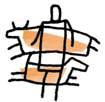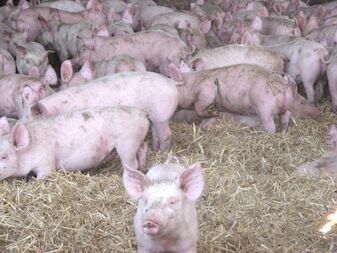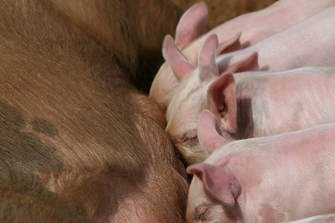PROHAND® PIGS AND PORK ABATTOIR
Research in both experimental and commercial settings demonstrate that stockperson characteristics, such as attitudes and handling behaviour, affect fear responses in farm animals, which through acute and chronic stress, can seriously limit farm animal welfare.
The ProHand® training programs, which were originally developed by Australian Pork Limited and the AWSC, use cognitive-behavioural training, in which the key attitudes and behaviour of stockpeople are targeted for improvement. Studies in the dairy and pig industries have shown that cognitive-behavioural training can successfully improve the attitudes and behaviour of stockpeople towards their animals, with consequent beneficial effects on animal fear, stress, productivity and meat quality.
ProHand® is an on-line training program which is offered by Australian Pork Limited to farm and abattoir stockpeople working in the Australian and New Zealand pork industries.
The on-line program was developed by the AWSC in collaboration with the Temple Grandin with funding from Australian Pork Limited and the Australian Meat Processor Corporation.
The program has been successfully trialed in North America prior to a planned release in North America.
Investigators: Paul Hemsworth, Grahame Coleman, Jeremy Skuse, Steve Moeller (The Ohio State University) and Temple Grandin (Colorado State University).
For further details, please contact Jeremy Skuse. A brief description of ProHand is available HERE
Research in both experimental and commercial settings demonstrate that stockperson characteristics, such as attitudes and handling behaviour, affect fear responses in farm animals, which through acute and chronic stress, can seriously limit farm animal welfare.
The ProHand® training programs, which were originally developed by Australian Pork Limited and the AWSC, use cognitive-behavioural training, in which the key attitudes and behaviour of stockpeople are targeted for improvement. Studies in the dairy and pig industries have shown that cognitive-behavioural training can successfully improve the attitudes and behaviour of stockpeople towards their animals, with consequent beneficial effects on animal fear, stress, productivity and meat quality.
ProHand® is an on-line training program which is offered by Australian Pork Limited to farm and abattoir stockpeople working in the Australian and New Zealand pork industries.
The on-line program was developed by the AWSC in collaboration with the Temple Grandin with funding from Australian Pork Limited and the Australian Meat Processor Corporation.
The program has been successfully trialed in North America prior to a planned release in North America.
Investigators: Paul Hemsworth, Grahame Coleman, Jeremy Skuse, Steve Moeller (The Ohio State University) and Temple Grandin (Colorado State University).
For further details, please contact Jeremy Skuse. A brief description of ProHand is available HERE
ELIMINATING PIG TAIL REMOVAL TO IMPROVE WELFARE AND INDUSTRY SUSTAINABILITY
Tail biting is confronting, an undesirable consequence of pork production, and is an adverse welfare and economic issue for the pork industry. Pigs have part of their tail removed (docked) soon after birth to prevent tail biting later in life. Continuation of tail docking is a substantial reputational risk that will threaten the sustainability of the $5.3 billion Australian pork industry. Elimination of tail docking will give significant welfare benefits. This will enhance societal confidence in the pig industry leading to improved market opportunities and production returns for pork producers. Support from the CRC-P will give pork producers the confidence to raise pigs with intact tails while maintaining high standards of pig welfare. Project participants:- SunPork Pty Ltd, PIC Australasia Pty Ltd, Australasian Pork Research Institute Ltd, Australian Pork Limited, RSPCA Australia, Rivalea (Australia) Pty Ltd, University of Melbourne, The University of New England, The University of Queensland
Tail biting is confronting, an undesirable consequence of pork production, and is an adverse welfare and economic issue for the pork industry. Pigs have part of their tail removed (docked) soon after birth to prevent tail biting later in life. Continuation of tail docking is a substantial reputational risk that will threaten the sustainability of the $5.3 billion Australian pork industry. Elimination of tail docking will give significant welfare benefits. This will enhance societal confidence in the pig industry leading to improved market opportunities and production returns for pork producers. Support from the CRC-P will give pork producers the confidence to raise pigs with intact tails while maintaining high standards of pig welfare. Project participants:- SunPork Pty Ltd, PIC Australasia Pty Ltd, Australasian Pork Research Institute Ltd, Australian Pork Limited, RSPCA Australia, Rivalea (Australia) Pty Ltd, University of Melbourne, The University of New England, The University of Queensland
EARLY STRESS EXPERIENCES AND STRESS RESILIENCE IN PIGS
Animal stress has substantial implications on the productivity, health and welfare of farm animals and thus farm profitability. This Australian Research Council Linkage Project aims to examine stress resilience in pigs. Modern pig farming is a major source of food, providing substantial nutritional, social and economic benefits in Australia and worldwide. Animal welfare is of increasing concern to the public, consumers and pork producers, and stress vulnerability is an animal health and production problem in the life of the commercial pig. This project will generate new knowledge on early life management to endow stress resilience in pigs, with expected benefits for animal welfare, farm productivity and profitability.
Working with collaborators from the University of Queensland (UQ), the University of Vienna (UV) and the United States Department of Agriculture (USDA) and industry partners Australasian Pork Research Institute, Rivalea Australia and Sunpork Farms this project will conclude in 2022.
Investigators: Paul Hemsworth, Roger Rassool, Alan Tilbrook (UQ), Jeremy Marchant-Forde (USDA) and Jean-Loup Rault (UV).
For further details, please contact Paul Hemsworth.
Animal stress has substantial implications on the productivity, health and welfare of farm animals and thus farm profitability. This Australian Research Council Linkage Project aims to examine stress resilience in pigs. Modern pig farming is a major source of food, providing substantial nutritional, social and economic benefits in Australia and worldwide. Animal welfare is of increasing concern to the public, consumers and pork producers, and stress vulnerability is an animal health and production problem in the life of the commercial pig. This project will generate new knowledge on early life management to endow stress resilience in pigs, with expected benefits for animal welfare, farm productivity and profitability.
Working with collaborators from the University of Queensland (UQ), the University of Vienna (UV) and the United States Department of Agriculture (USDA) and industry partners Australasian Pork Research Institute, Rivalea Australia and Sunpork Farms this project will conclude in 2022.
Investigators: Paul Hemsworth, Roger Rassool, Alan Tilbrook (UQ), Jeremy Marchant-Forde (USDA) and Jean-Loup Rault (UV).
For further details, please contact Paul Hemsworth.



